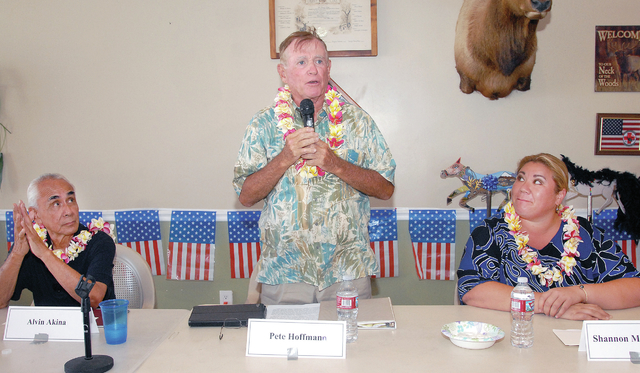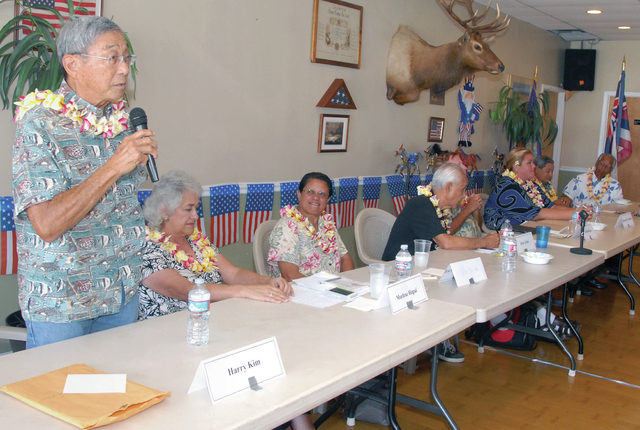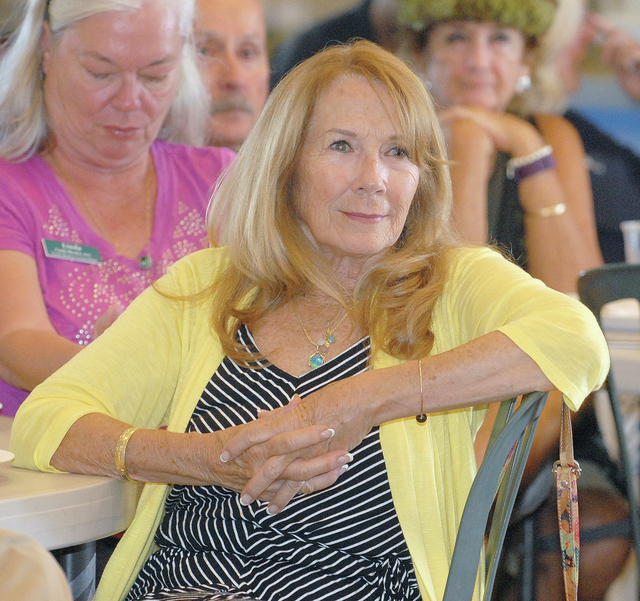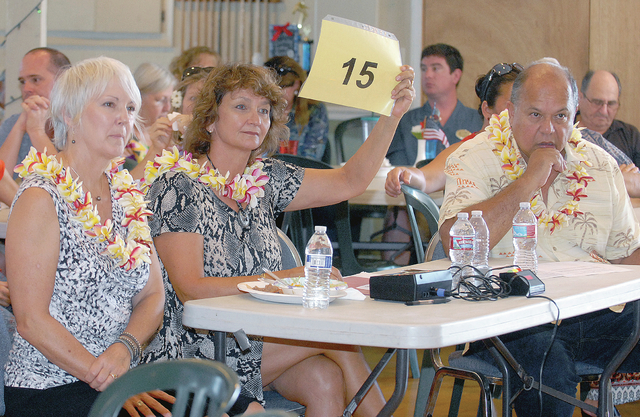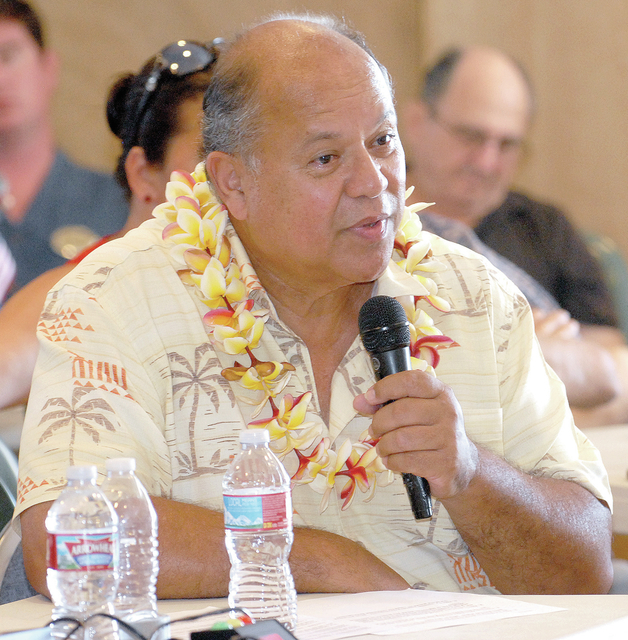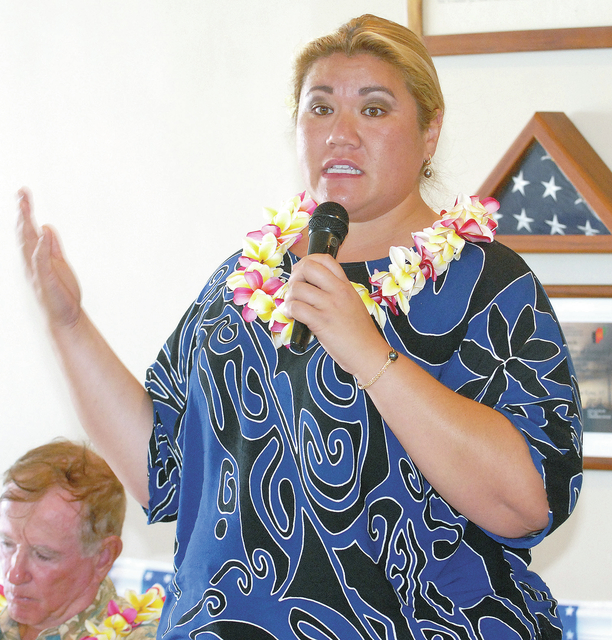Mayoral forum helps kick off election season
KAILUA-KONA — Should the county overhaul a sluggish building permitting process, and what to do about having too few places for the homeless? And how do you clean up the county government we already have?
ADVERTISING
Call it a warm-up for the kinds of political discussions that will be cranking into full gear the next few months heading into election season.
For many of the 75 or so community members and real estate agents who grabbed lunch Friday at the Kona Elks Lodge, it was their first good look at eight mayoral candidates in the same room. All 13 individuals vying for the county’s highest office were invited to the event sponsored by the West Hawaii Association of Realtors.
To hear Pete Hoffmann of Waikoloa tell it, it’s time for a new mayor to rebuild trust in government.
“I believe I can do better than the previous two mayors,” said the former County Council chairman, including in his comment the man likely to be one of his most serious rivals, former mayor Harry Kim, and current Mayor Billy Kenoi, who is under indictment after his administration became embroiled in scandal over use of a county credit card at a hostess bar.
Hoffmann said he would work to promote openness in government and appoint department heads based on their qualifications, “regardless of past political relations or bias.”
On the issues, Hoffmann said the county need look no further than the 1.5 million gallons of wastewater going into the ground at the Kealakehe Wastewater Treatment Plant each day, and a National Park Service petition from 2013 to designate the Keauhou aquifer a state water management area.
“If we don’t address and solve the aquifer problem it will terminate development for some time,” Hoffmann said, referring to the red tape that would hinder development under the water management area designation.
Wally Lau, who served as Kenoi’s managing director, said the mayor must “work aggressively with fellow mayors to say to the state, ‘The only thing we want is fair. We allowed you to take that (greater share of the tax) during hard times; just give us back what is our fair share.’”
The job of mayor is essentially a balancing act, he said, and discussions are needed among island residents to hammer out the direction the island should take, including key questions about where development should be centered.
“My decisions will be based on what is good for the people, the economy and the natural environment,” he said.
The county building permit process needs to be streamlined, made more transparent and more predictable, Lau said.
“We should step out of the way and let the people do their business,” he said.
That building permit process is onerous — the review process can take six weeks to two months — and home builders are often at a loss to understand changing rules, said candidate Shannon McCandless of Waimea.
That plays into the lack of affordable housing and illegally built properties where everyone loses out, she said.
McCandless was born and raised on Oahu. A graduate of Kamehameha Schools, she heads the county driver’s license division. Her interest in the mayor’s post is spurred by a desire to have a positive hand in the future of her children and grandchildren, she said.
Wendell Kaehuaea of Hilo said the state and county have no solution for homelessness. And the notion of affordable housing is skewed, he said.
“Affordable is $200,000,” he said. “The county has every chance to control that before developers build $300,000 homes.”
This is a third mayoral bid for Kaehuaea, who said he has built two radio stations. Asked for his opinion of the biggest issue facing the real estate industry, Kaehuaea said it’s lack of support from the county, delays in rezoning and delaying of contractors on the west side.
“We need to analyze if a project benefits the community,” he said. “If it doesn’t, I don’t see any reason for it go forward.”
Alvin Akina Jr. of Kailua-Kona said the middle class has no chance of owning a home in West Hawaii.
“Land prices go up and up, yet we can’t afford to buy,” he said.
Akina said mainlanders are flipping homes, driving the price up.
In his classic soft-spoken style, Kim pointed to what he called “the merits of his past work.” For Kim, that meant eight years as mayor and a decade heading up Hawaii County Civil Defense, as well as his time as a teacher.
“There’s a lot of very serious work to be done,” he said.
Asked what portion of the island should be zoned residential, Kim said there shouldn’t be a set percentage. Getting infrastructure into areas of need is the issue, rather than zoning, he said.
Studies have been conducted regarding how much of the transient accommodations tax the county should receive, he said.
Helen Luta of Kealakekua related a story of how she went out to get the 15 signatures required on her nomination paper, got 50 names, but only seven were registered.
“A lot of people have lost their faith in government,” she said. “We need a fresh start.”
Many financial issues need to be addressed at the county level, like getting people into homes but also making sure they can keep them, Luta said. The county must tackle issues of where to place affordable housing and how to help get it completed, she said.
Marlene Hapai of Hilo is a science educator and a former member of the University of Hawaii Board of Regents. She said honesty and integrity in the real estate profession is important — including efforts to make sure clients understand the various lava zones.
“Are you selling something they can’t afford, so in a few years they’ll reach the breaking point?” she asked the room.
Hapai originally thought it would be a good idea for the county to aggressively pursue more TAT revenue. Then she saw a presentation on how much of that money eventually rolls around to the counties in other ways.
“As long as that money comes back to the county, I don’t care who gets it,” she said. “We should be working as a team.”


